The Village project is a newly developed project in which families can participate. The subject of the project is to find out how support in daily live effects children whose parents have a mental illness. We offer support for the families. This is intended to strengthen the health and well-being of the children.
The Village Project does not evaluate your parental skills. What you tell us is treated confidentially. The project offers dialogues and activities. In doing so, we want to find solutions that support you and your family in everyday life. Together with you and your child/children. You are the expert for yourself and your family.
The project takes place within the framework of a study. The aim of the study is to understand how to better support children of mentally ill parents. The researchers look at which measures are particularly helpful for the children. The results can help other parents and children in the future.
* For example, these could be people who support you in the household or take your children to sports.
In order to participate in the Village Project you need a referral from one of the following study centres:
If you are not receiving treatment at any of the above-mentioned study centres, you can alternatively be referred to the Village Project by your family doctor or registered psychiatrist.
If you have any further questions or would like to know more about the project, please contact Philipp Schöch (project coordinator) on 0676 580 04 90.
The inclusion criteria for participation in the Village Project are as follows:
It is often important for the children to know about the mental illness of their parent. Therefore, we have set up a small library to help families to talk about this topic.
The books in our library are listed below, if you would like to borrow one or more, you can reserve them calling this number: +43 676 5800490 and then come to pick them up at our office.
The "Child Network Activity"
For a first impression of how our Village facilitators get to know the children's everyday life, you can click on the "Jetzt ausprobieren" Button on the left side of the page.
As part of this online game, children can create an avatar or upload a photo. Then they can place activities and people inside the spider web. The distance to their own picture in the middle depends on whether they play a bigger or smaller role in their life.
This game allows the children to talk about their everyday life, interests and attachment figures in a playful way. This provides the village facilitator with a good idea of which activities and social contacts are particularly important for the children. Consequently, the facilitator can then work together with the family on a support network that is strength-based and oriented towards the individual needs of the children.
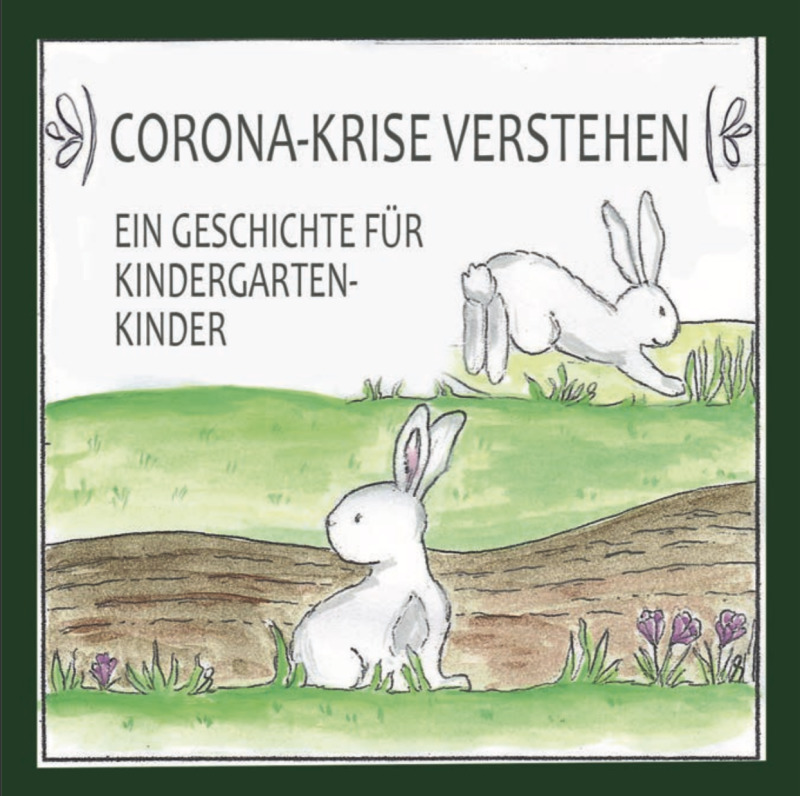

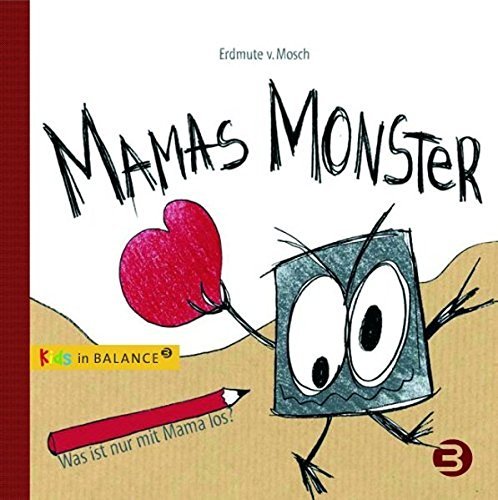
Book in German language – A depression monster which steals feelings, is there such a thing? Since Rieke knows what's going on with Mum, she's feeling better. This enchanting picture book is the first to enable parents, grandparents and educators to explain to small children what depression is.
"Mama, are you mad at me?" little Rieke wants to know from her mother, who has only been lying tired in bed or on the sofa for days and has no desire to play. Rieke is sad and feels guilty because she thinks she did something wrong. With sensitive language and wonderfully delicate pictures, Erdmute von Mosch has designed a book that makes 3-6 year old children understand depression and explains that sadness and withdrawal are symptoms of a disease and can be treated with patience and help from doctors and therapists.
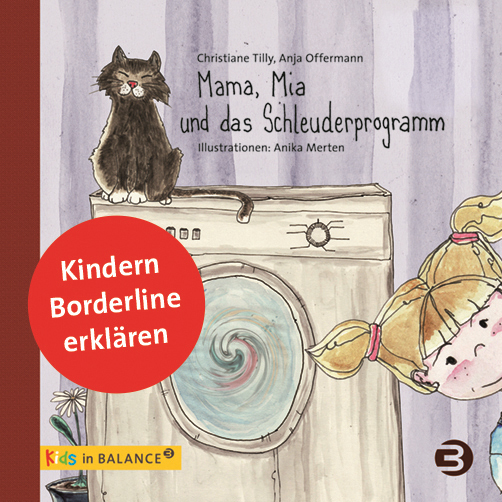
»Bei deiner Mama wirbeln ganz viele Gefühle und Gedanken, Ängste und Wünsche in ihr herum. So wie bei einer Waschmaschine. Erst wenn die Waschmaschine still steht, kann man die einzelnen Teile auseinander halten, sortieren und auf die Leine hängen. So ist das mit den Gefühlen auch. Jedenfalls bei der Krankheit, die deine Mama hat.«
Wenn ein Familienmitglied psychisch erkrankt, geraten nicht nur die erwachsenen Angehörigen aus dem Gleichgewicht. Auch die Kinder erleben eine große Verunsicherung und suchen nach Erklärungen für das Verhalten des Elternteils. Häufig fühlen sie sich schuldig an der Situation und machen sich große Sorgen. Es ist wichtig, Kinder nicht allein zu lassen mit ihrer Not, ihren Ängsten, Fragen und Wünschen. Sie brauchen Entlastung und Ermutigung, altersgemäße Informationen und Raum für Spaß und Spiel.
Dazu soll dieses Buch beitragen. Die Geschichte gibt einen Einblick in die Borderline-Erkrankung. Kinder lernen die Symptome zu verstehen und welche Hilfemöglichkeiten es gibt. Sie begreifen, dass sie geliebt werden, auch wenn Vater oder Mutter das im Durcheinander der Gefühle nicht so zeigen können.
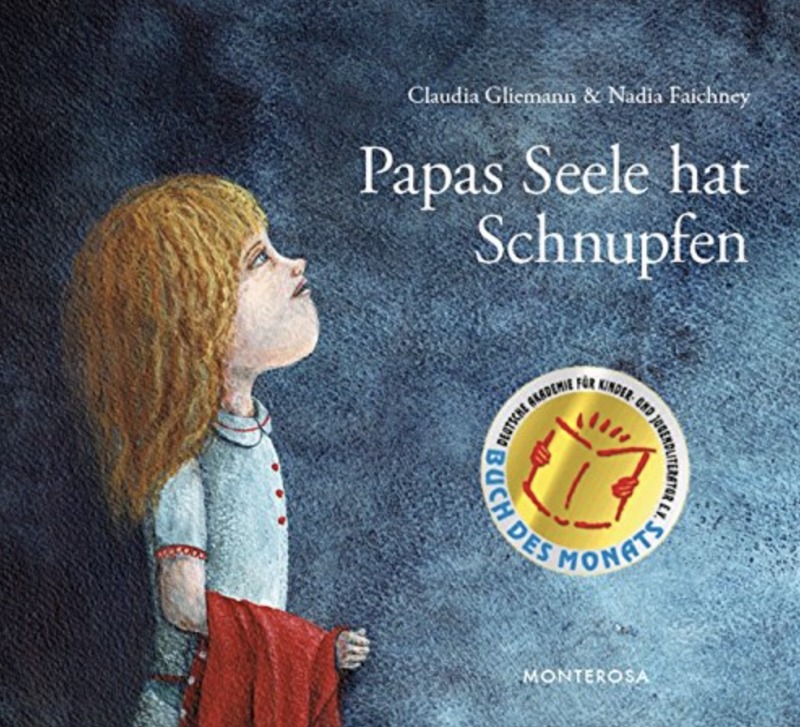
Neles Zuhause ist der Zirkus. Ihre Familie zählt zu den besten Seilartisten der Welt. Schon seit Generationen. Doch dann wird Neles Papa krank. Seine Seele bekommt Schnupfen. Und das in einer Welt, in der alles bunt und fröhlich ist und man eigentlich glücklich sein könnte. Neles Papa, der der immer so stark war, wird schwach. Vor Neles Augen – und vor den Augen der ganzen Welt. Nele schämt sich für ihren Papa. Sie ist wütend. Er tut ihr Leid, und sie fragt sich, was wohl ihre Freunde denken und ob sie sie noch mögen werden. In ihre heile Welt ziehen Schatten ein. Sie hat viele Fragen, auf die sie keine Antworten weiß. Ihre Mama will sie nicht fragen, weil sie auch schon so traurig ist. Oma und Opa sind weit weg. Zum Glück gibt es den Dummen August, der Nele erklärt, warum ihr Papa so traurig ist und dass auch die Seele Schnupfen haben kann und dass alles seine Zeit braucht. Gemeinsam mit der Zirkusfamilie erlebt Nele, dass es ihrem Papa manchmal besser und schlechter geht, aber er gibt nicht auf, und durch die Krankheit entdeckt er plötzlich Fähigkeiten, die ihm vorher gar nicht so bewusst waren. Ein Buch zu einem schwierigen und traurigen Thema, das trotzdem nie düster ist, sondern eingehüllt in ein warmes, sattes Blau, mit einer positiven Farbe am Ende: einem Picknick im Grünen mit einem warmen Herbstsonnengelb.
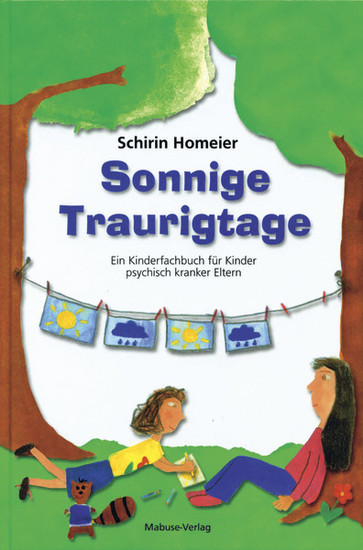
Book in German language – Lately, Mom's been a little different: she's so weak and depressed. Like many children of mentally ill parents, Mona reacts to these "sad days": she suppresses feelings of anger or sadness, assumes more and more responsibility and yearns for happy "Sundays". Only when Mona entrusts herself to a caregiver does she learn that her mother suffers from a mental illness and needs expert help. Mona then addresses the child reading the book directly with essential questions: What is a mental illness? Am I to blame for it? Who can help Mom or Dad? Who can I talk to? In addition, an emergency plan for times of crisis will be introduced. In the advice section, private and professional caregivers receive suggestions on how to support affected children.
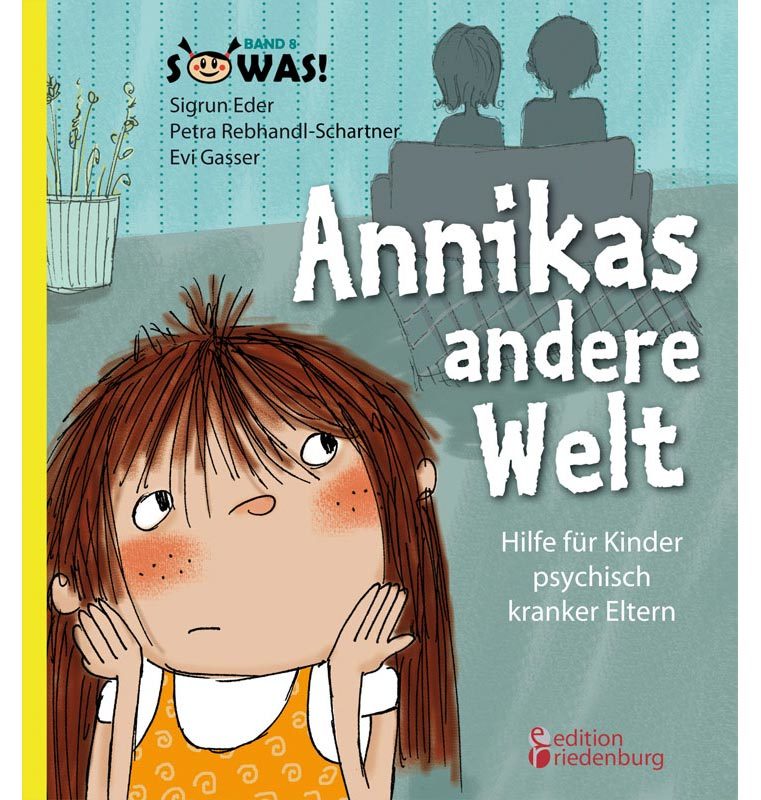
Book in German language – The non-fiction book "Annikas andere Welt" is divided into three sections: In the first, children receive information about their parents' mental illness, the signs and effects on themselves, the parent-child relationship and family life. Also, ideas are given on how children can explain the illness to others of the same age and how they themselves can cope better with it. In addition, numerous interactive pages invite children to self-reflect, to discover their own abilities and coping strategies, and to develop a differentiated picture of the family. The documents in the book are also suitable for psychological, psychotherapeutic, medical and educational support.
In the second part, parents, relatives and psychosocial helpers are provided with information on childhood experience, follow-up problems, risk factors and external accommodation.
For psychologists and psychotherapists, the third section contains suggestions for working with mentally ill parents and their children.
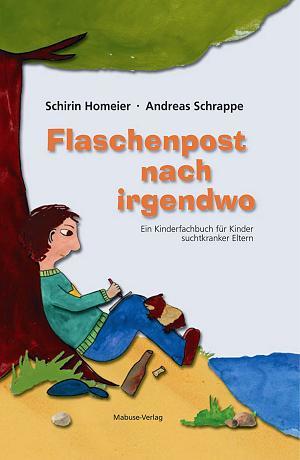
Something's got to change: Mark's dad drinks too much, his parents just argue, and at school everything goes haywire. Mark can't talk to anyone about it. In his trouble he writes a message in a bottle. Then things take their course.
Sensitive, lovingly illustrated and in the proven style of the book "Sonnige Traurigtage", children of addicted parents receive support for their everyday lives through a picture story and an age-appropriate explanatory section.
A guide for adult caregivers and specialists rounds off the children's textbook.
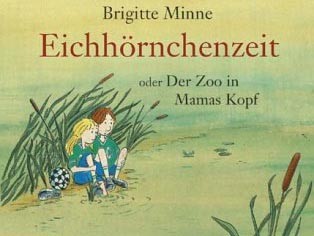
Out of a hundred penalty shots, eighty-five hit the goal! Amber is finally ready to join her friend's football team. But her mother isn't the slightest bit interested. She always wants to sleep. Or falls to the other extreme. She acts like a monkey. One day everything becomes too much for Amber. . .
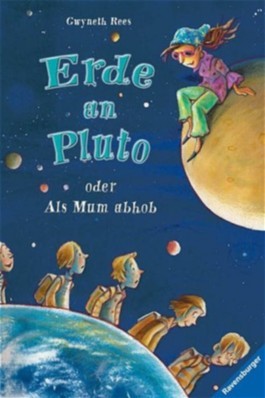
Daniel's angry. First the move and now that too! How can Mum become headmistress at his new school? And as Dad urgently needs to fly to New Zealand, Mum has one crazy idea after another. Is it because she has stopped taking her medication? Something's wrong and Daniel thinks he's the only one who can help her. But Abby shows him that there are many things that are supposedly abnormal, but for which there's nothing to be ashamed of.
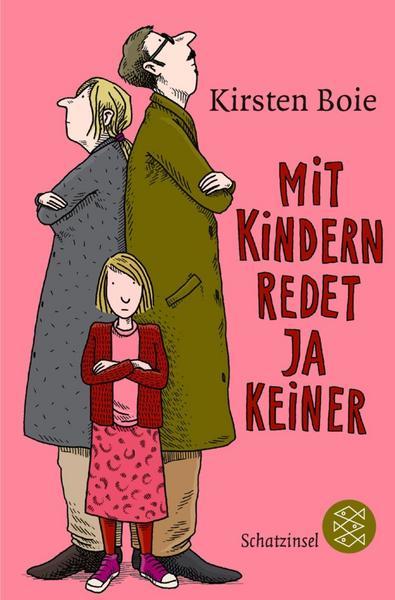
Actually, Charlotte and her parents feel very comfortable in the new house in the countryside. But then Charlotte's mom suddenly starts ranting all the time. Besides, she is sad in bed and no longer cares about the household. Dad is angry. And Charlotte too: What's the matter? Charlotte really needs someone to talk to and is jolly glad that her best friend Lule and her optimistic mother are around.
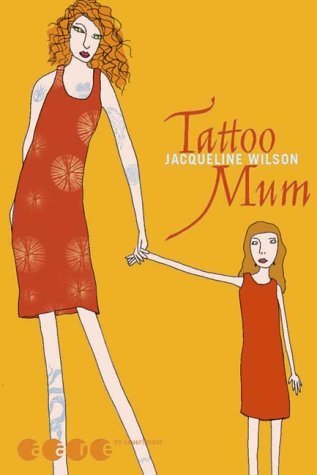
Dolphin adores her mother: she's got wonderful clothes, bright hair and vivid tattoos all over her body. She definitely lives a colourful life. Dolphin's older sister, Star, also loves her but is beginning to wonder if staying with a mum whose temper can be as flashy as her body-art is the best thing for the girls...
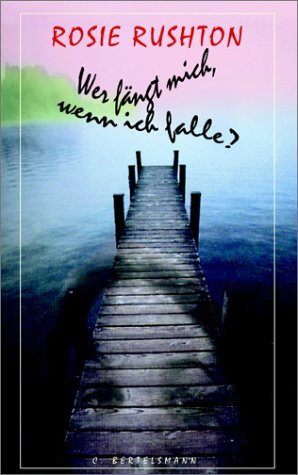
Georgina's mother is in hospital after a nervous breakdown and Georgie has the feeling that she is slowly going crazy herself. A great champion in swindling for years, she's inventing story after story about her mother's whereabouts, because nobody should know that her mother is crazy! Even in front of her best friend Amber she keeps the truth secret. Gradually, however, the tissue of lies over her threatens to collapse.
But then there is a light at the end of the tunnel: In the hospital Georgie meets Leo, with whom she falls head over heels in love. Almost at the same time she meets her new neighbour Flavia. The unconventional woman makes Georgie confide in her and shows her a way out of the dead end into which she has maneuvered herself.
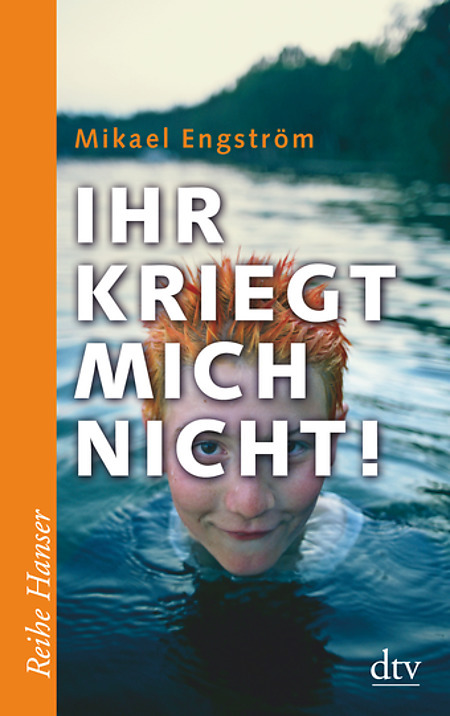
Mik is a survivor, and he must be: his mother has died, his father has a serious alcohol problem, and his brother is taking his first steps as a petty criminal. When Mik comes to the attention of the youth welfare department, it is quickly decided that he has to leave home and go to a foster family. For the transition, Mik is staying with his aunt Lena in northern Sweden, and the small town where his aunt lives, with all its whimsical characters, quickly grows quickly to his heart. He would love to stay forever! But the law does not provide for simple solutions. Mik has no other choice, he must fight. Fortunately he is not alone. Aunt Lena and the whole village stand behind him.
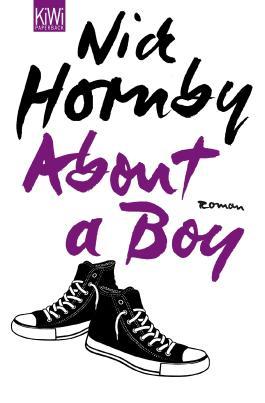
Will is a rich, child-free and irresponsible Londoner in his thirties who, in his search for available women, invents an imaginary son and starts attending single parent meetings. As a result of one of his liaisons he meets Marcus, a strange 12-year-old boy with problems at school. Gradually, Will and Marcus become friends and, as Will teaches Marcus how to be a cool kid, Marcus helps Will to finally grow up.

A film based on the book by Nick Hornby. Story revolves around a boy with a single mum who has depression and at times is suicidal. The film is available on video. It is rated M but can usefully be used with upper primary children if the right excerpts are used, and certainly with teenagers.
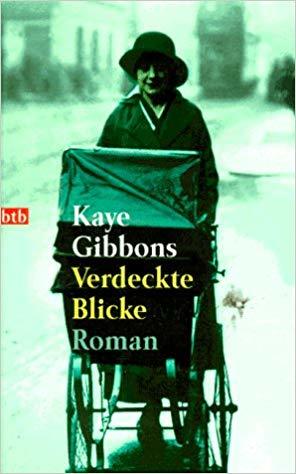
In her small town of Bend of the River, Maggie Barnes is considered "confused and the woman with all the problems". But for 12-year-old Hattie, her mother Maggie has two faces. Because at home, when Hattie can be alone with her, Maggie Barnes is often loving and warm-hearted, but often also evasive and distant. Hattie and her brother Freddie have to cope with these two worlds in which the mother seems to live. And despite all her boundless love for her mother, Hattie sometimes finds it difficult not to lose courage and hope. Sensitively and with the eyes of young Hattie, Kaye Gibbons looks at the fate of a deeply divided young woman between unrestrained joie de vivre and paralyzing depression. Her Maggie Barnes is undoubtedly one of the most fascinating and profound novel characters in young American literature.
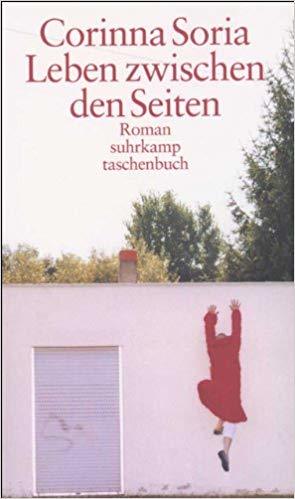
Zoe defiantly defends her desire for normality and childhood against mysterious whisperers who rush the mother through a hostile and threatening environment. The child's resistance is also directed against an incomprehensible and judgmental environment and its Catholic blame. Indian literature and poetry, especially Rückert's poems, are Zoe's companions. Reading becomes a training for survival and an alternative to an unbearable life situation. Soria narrates laconically and distantly, driving the reader rapidly along the boundaries of the "real" and the "normal", the definition of which she leaves to the reader.
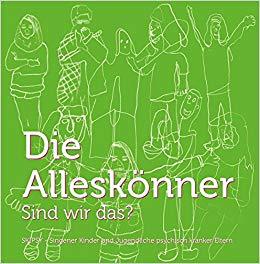
As part of the SKIPSY project for children and adolescents of parents with a mental illness in southern Germany (Singener Kinder psychisch kranker Eltern), 29 children and adolescents have produced texts and pictures for a book with which they want to help others understand their parents' mental illnesses.
In order to include as many topics as possible in this book, the authors decided to use the alphabetical order as a guide through the book. They treat topics from A like fear (German "Angst") over K like strength ("Kraft") up to Z like future ("Zukunft"). With the support of group leaders, a book was created in loving work that gives a deep insight into the thoughts and feelings of the children on 144 pages.
With texts, pictures, poems and sculptures, the children express their feelings, fears and other sensitivities in their own way.
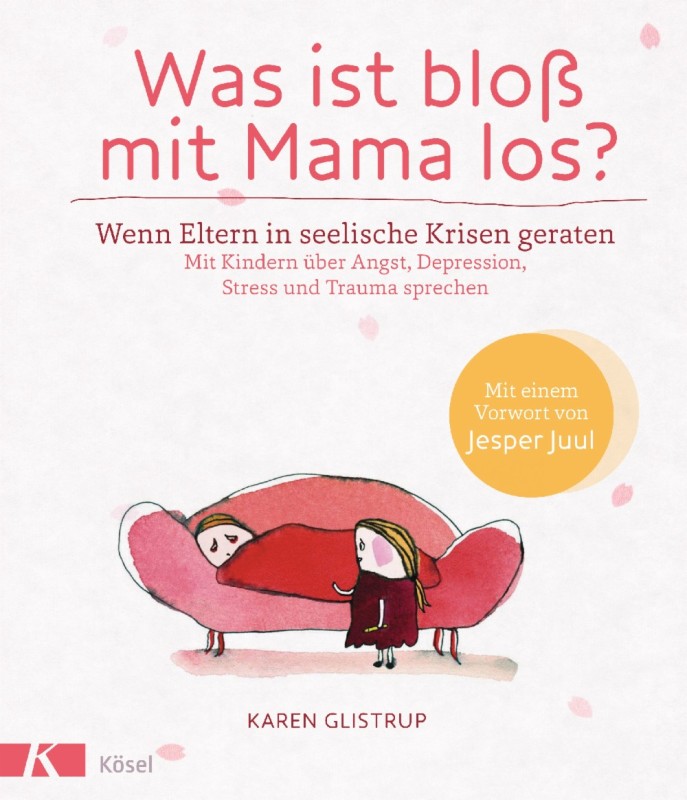
Every seventh child experiences its parents in a psychological crisis. Helplessness, feelings of guilt and above all speechlessness are usually the order of the day. With expressive illustrations and a lot of background knowledge, this book helps to raise awareness and start a conversation. For children from 3 to adulthood.
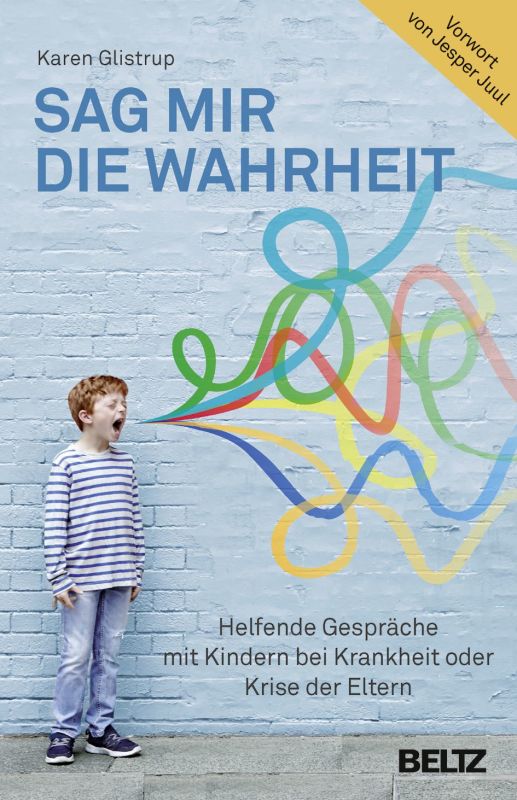
Whether life crisis, illness or grief: What parents have to deal with also burdens their children. This book encourages to talk to children in a child-friendly way and shows ways to understand their worlds of emotions and thought.
The child's conversation partners can be the more stable parent, but also relatives, friends, educators and teachers or - if possible - the affected parent himself. Everything repressed loses its horrors as soon as it is pronounced in a child-friendly way. In this way, open conversations not only help to overcome children's fears and feelings of guilt, they also relieve the burden on adults.

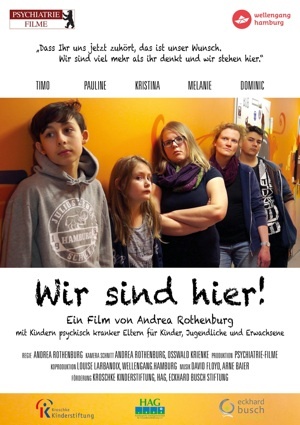
Documentary in German language – When a mother or father breaks a leg, it is talked about. When a parent becomes mentally ill, it is often concealed. But it is good for children to be seen with their feelings and worries, because it is not only difficult for the parents, but also for the children.
How do you feel about the diseases of the parents? How do you deal with that? How is depression, bipolar disorder or schizophrenia perceived? What can a child do if they feel alone and overwhelmed? What would the children and young people wish for? These are questions that Pauline, Kristina, Melanie, Dominic and Timo confront, and they encourage other children to live their lives, despite their parents' illnesses. The children talk about their experiences, are brave and say, "We are here!"

Movie in German language – The well-known German comedian Hape Kerkeling lost his mother to her depression when he was a child.
His autobiography "Der Junge muss an die frische Luft" ("The boy must go out and get some fresh air") illustrates the helplessness and powerlessness of young "Hans-Peter" and his father towards the illness – and how the boy, after his mother's suicide, is taken in by his grandparents and grows up to become the person we today know from the limelight. The film version of the book is now running in cinema.
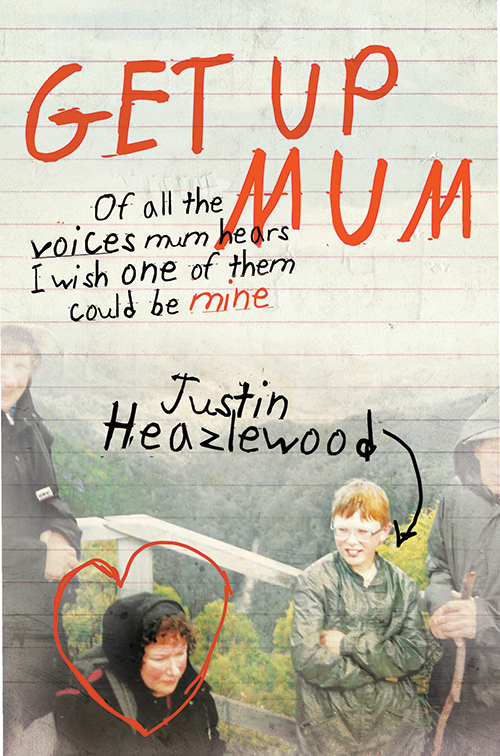
It’s 1992 in Burnie, Tasmania and 12-year-old Justin lives alone with his mum. When she is well, Mum is perfect. She knows he likes his carrots raw and his toast cooled, and she knows how to sooth his growing pains. But when she is sick she cries uncontrollably and never gets out of bed.
High school is on the horizon and Justin is bursting with adolescent energy. But his mum’s mental illness hangs over him like a shadow and he feels the need to grow up fast.
Told with youthful exuberance, Get Up Mum is a wildly endearing, entertaining and incredibly powerful memoir about love, family, and coming-of-age.

Book in German language – When parents are mentally ill, their children also suffer. Instead of growing up sheltered and protected, they often become the familiy's pillar overnight. This is the first book to report on the plight of the overlooked children. It offers support to parents, children, educators and other interested people to perceive problems early enough and to act appropriately.
"As a person affected, I had to experience for myself how the children are simply overlooked by mentally ill parents. This must not be allowed to happen." The emotional mortgage with which these children go into life is illustrated in the book by the moving reports of grown-up children. They – even as adults – get into deepest conflicts of loyalty when they reveal the "family secret". To whom should they turn, to whom can they confide when the clostest caregiver yet is not approachable? These urgent questions are answered here. The authors present models and initiatives that offer support to parents and children.
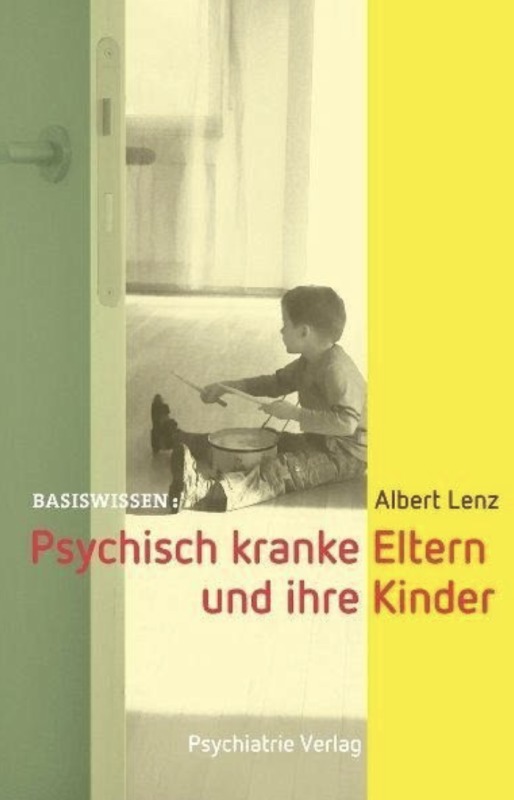
Book in German language – Children as relatives of mentally ill people are too often overlooked. This book shows why and how they should be considered within the psychosocial assistance system.
Including children in the care of their mentally ill parents is not only a necessary measure to protect the mental health of children. A co-supply of the children also means not to leave ill parents alone with their needs and fears of care. The author, an expert on the subject of children of mentally ill people, shows numerous concrete ways in which clinics, in particular, can implement the co-care of children.
The compact volume from a basic knowledge series highlights the possibilities for cooperation between psychiatry and youth welfare and offers a convincing presentation of the current state of research on the involvement of children.
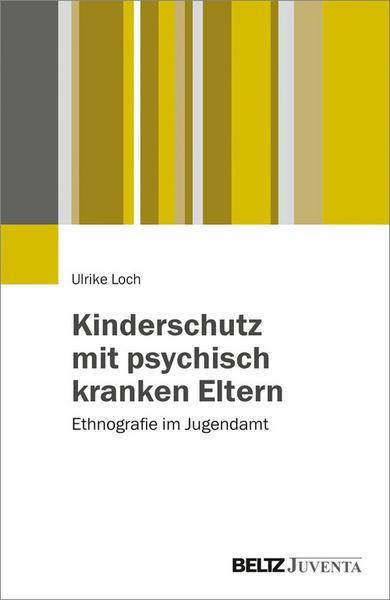
Book in German language – Child protection work with mentally ill parents largely means cooperating with parents who are interested in the well-being of their children and who are nevertheless unable to ensure this sufficiently due to their mental constitution. Case studies from the field of child and youth welfare are used to illustrate what successful child protection work with this target group can look like.
Child protection with mentally ill parents takes place at the interface of child and youth welfare and psychiatry. So far, this group of recipients has received little attention from the expert audience, even though these children bear an increased risk of being housed elsewhere in the first years of their lives. This pattern of action is currently symptomatic, as the ethnographic survey of child protection cases in Germany and Austria shows. Reconstructed case studies are used to illustrate how child protection work is currently being designed and which developments and support measures are necessary in order to enable this group of recipients to reconcile child protection and a successful parent-child relationship.
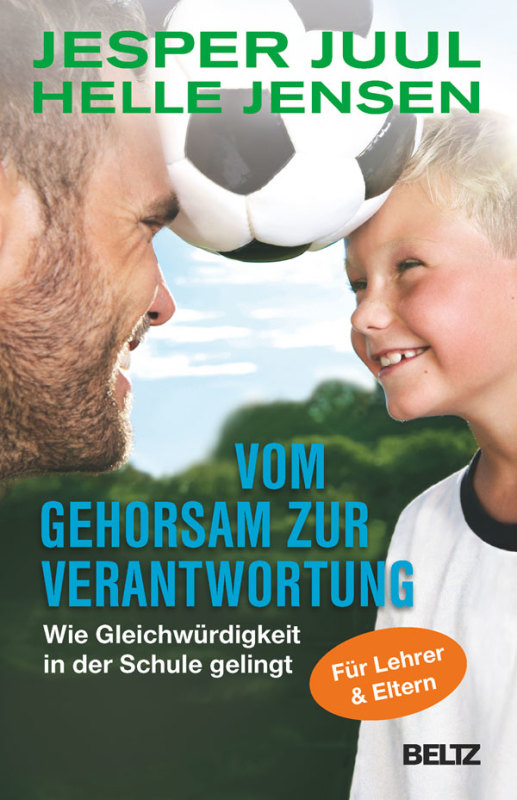
Book in German language – Strengthening children in their personal responsibility instead of coping with conflicts by exercising power – this is what the authors of this non-fiction book want to encourage. Pedagogues from various fields as well as parents will find tips and examples from practice that are supported by findings from brain research and psychology. The Innsbruck-based psychologist and supervisor Robin Menges has revised and supplemented this edition to meet the conditions in German-speaking countries.
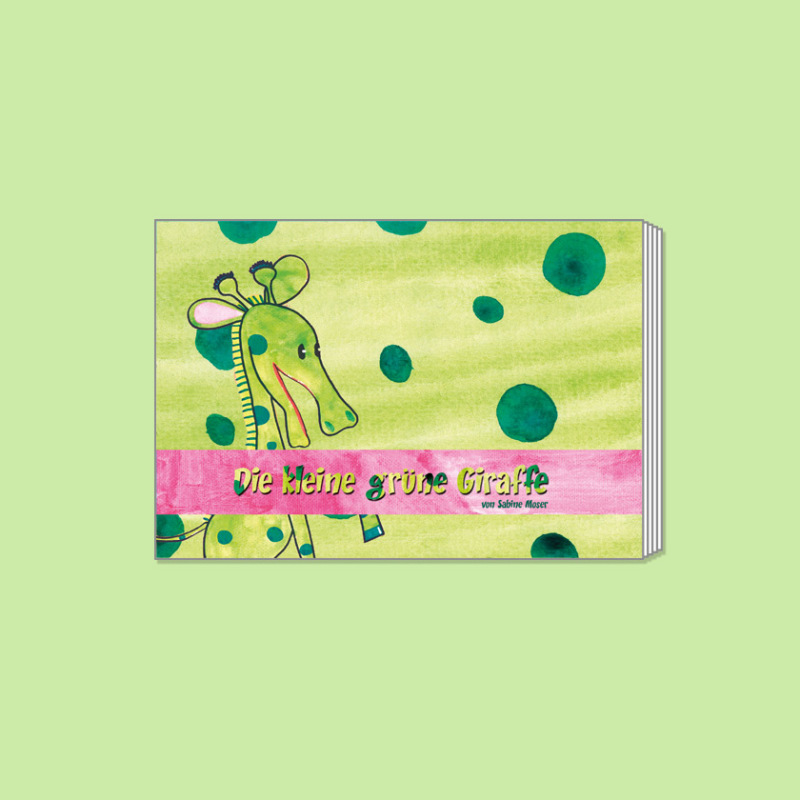
Book in German language – The children's book "Die kleine grüne Giraffe" deals with being different and accepting one's own individuality. With this book, Sabine Moser wants to strengthen the self-confidence of children in particular. Even with a perceived handicap, they should be able to take initiative and face discrimination with self-confidence. This is easier together with like-minded people. Inspired by her work with diabetic self-help groups, Moser has written and illustrated the story. This ends with an unusual wedding and continues in a second book.
Is being different a reason to be sad? Not in the club of the others! The little green giraffe Esmeralda and her friend Floh are joined in this club by the chequered zebra Caro, the curly hedgehog Curly, the fragrant skunk Skunky and many other adorable animals with special features. Uncle Isidor, the ingenious inventor, builds a star cleaning machine and has many great ideas that make life easier for the friends. The members of the others' club are there for each other and experience the greatest adventures you can only have if you are – different.
For children aged five and over to read aloud.

Wenn eine Familie von einer psychischen Erkrankung betroffen ist, so sind alle Familienmitglieder betroffen. Jedes auf seine Weise. Der gesunde Vater oder die gesunde Mutter ist durch die Veränderungen häufig überfordert. Der erkrankte Elternteil hat mit der eigenen Krise zu kämpfen und zudem mit den Schuldgefühlen, als Mutter oder Vater versagt zu haben. Und die Kinder?
„Sie erleben neben den unerklärlichen und unberechenbaren Veränderungen des erkrankten Elternteils meist auch noch das Auseinanderbrechen ihrer Familien und beziehen all diese bedrohlichen Entwicklungen häufig auf sich selbst. Sie fühlen sich schuldig und verantwortlich, entwickeln „Erlösungsfantasien“ und sind überzeugt, wenn ihnen nur die richtigen Lösungen einfallen und sie sich in dem von ihnen gewünschten Maße verändern würden, könnten sie die gesamte Lebenssituation ihrer Familie beeinflussen, die erhoffte Gesundung herbeiführen.
Gyöngyvér Sielaff hat in ihrem Buch „Wie auf verschiedenen Planeten“ zahlreiche Erfahrungsberichte von nun erwachsenen Kindern, von Müttern und Vätern zu diesem Thema gesammelt.
Verwirrende und beschämende Empfindungen, Zweifel und Schuld, Wut und Enttäuschung über schmerzlich vermisste Zuwendung werden so eindrücklich nachvollziehbar.
Für Jugendliche ab 16 Jahren + Erwachsene
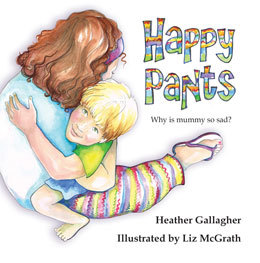
When Mummy wears her happy pants we build sandcastles, go out for baby cinos and have lots and lots of cuddles. But when she comes home with baby Darcy, her happy pants stay in her wardrobe...
"Postnatal Depression effects 1 in 7 women. Happy Pants is a heartfelt way to help older children know that their mum's postnatal depression is not because of them, that dads are loving and caring, families can support each other and that mum will get better with help." - Belinda Horton, Chief Executive Officer, PANDA (Post & Antenatal Depression Association)
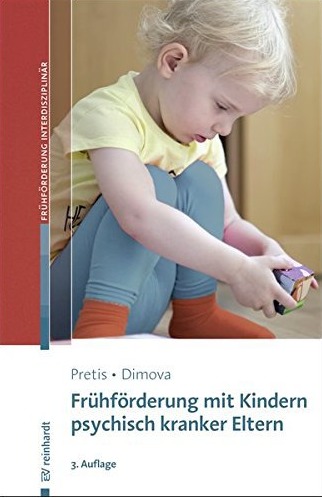
Etwa drei bis fünf Millionen Kinder im deutschen Sprachraum haben mindestens einen Elternteil, der psychisch krank ist. Die Erkrankung der Eltern kann schlimme Folgen für die Kinder haben: Individueller Rückzug, schwierige soziale Verhältnisse, lange Krankenhausaufenthalte können eine sichere Bindung an die Eltern und eine gesunde Entwicklung der Kinder erschweren. Viele dieser Kinder leiden stumm und von Einrichtungen der psychosozialen Unterstützung unbemerkt. "Lieber früh fördern statt später behandeln", sagen die Autoren und zeigen, was man in der Frühförderung für Kinder psychisch kranker Eltern tun kann. Sie informieren über typische Störungsbilder der Eltern und erklären, wie das Kind die Erkrankung wahrnimmt. Einen neuen Schwerpunkt legen die Autoren auf die Bedeutung der familiären Zusammenarbeit, eng verknüpft mit einer "Resilienzlandkarte" aus langjähriger Praxiserfahrung. Die 3. Auflage wurde überarbeitet und durch neue Abbildungen und Tabellen ergänzt.
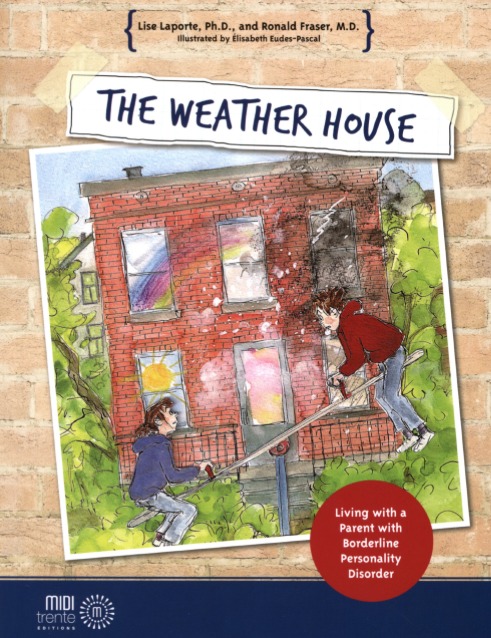
This book provides clinically sound and age-appropriate information for children, answering questions about the borderline personality disorder of a parent, and suggesting ways to cope with the difficult situations.
Through analogies of weather patterns, the book provides psycho-educational comments by a “weather wiz” who explains the mother’s sometimes strange behaviours that can be challenging to comprehend. The wonderful illustrations help with the understanding, and lighten the story with humour. This book will help teach children to better understand what is happening at home and how not to feel responsible for their parents’ stormy times.
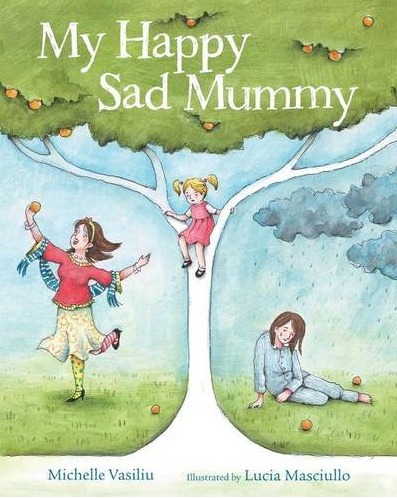
Author Michelle Vasiliu draws from her own experience of bipolar disorder, cleverly and humorously portraying the emotional roller coaster of this illness, as a young child might perceive it and how through these difficulties, the bond of love between mother and child remains true. A fantastic picture book and invaluable resource for parents, teachers and health professionals
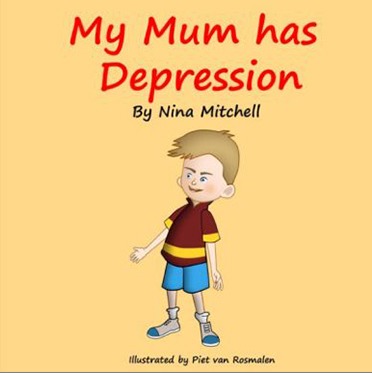
Nina is the mother of three boys, a qualified primary school teacher and now a first-time author. She has also suffered from depression for several years. When she found it challenging to explain the highs and lows of the illness to her sons, her answer was to write and self-publish a picture book. My Mum has Depression explains depression in simple words and pictures suitable for children of all ages. The purpose of my book is to provide a tool to adults so they can start the conversation with children. It would be an excellent resource for families, teachers, school guidance officers, public libraries, social workers, community aid centres, and similar aid organizations.
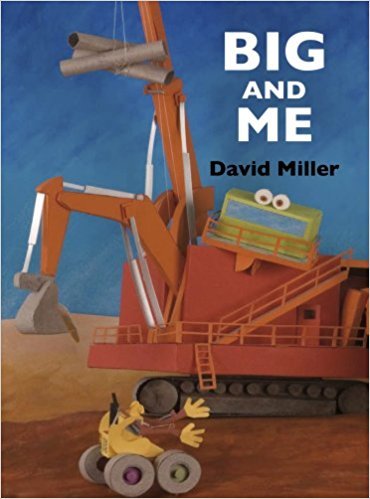
Big and Small are machines that work together as a team. ‘But some days Big goes a bit wobbly, and I get a lot worried.’ Big malfunctions in a variety of ways and Small tries to help with the assistance of The Boss and Mechanic. The story is a metaphor for a child living with an adult who experiences mental illness but could also fit for children who have a parent with a substance misuse problem. BIG and ME is dramatically illustrated with paper sculpture.
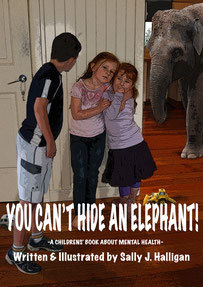
This illustrated book is used as supported reading for children with a parent with a diagnosed mental illness. The book encourages the 'elephant in the room' or the stigma of mental illness, to be discussed openly in an age appropriate manner.
A wonderful book for families facing the associated challenges when a parent has a mental illness. The story is told through the voice of a female middle child.
This book comes with a Safety Plan to complete with appropriate support. The book is the perfect way to start a conversation about mental health, feelings and experiences. It provides hope and guides the development of strategies that will help to empower children. It is a wonderful resource for therapists, case workers, counsellors, welfare officers, social workers, mental health nurses, group facilitators and parents.

Adrian experiences a childhood in the extraordinary milieu of a drug scene on the outskirts of an Austrian city, and with a mother between caring and drug intoxication. When he grows up, he wants to be an adventurer. Despite everything, it is a sheltered childhood for him, the best of all worlds, until the outside world can no longer be shut out. Helga knows she must get clean if she is not to lose her son forever. But to do so, she must defeat her own demons.
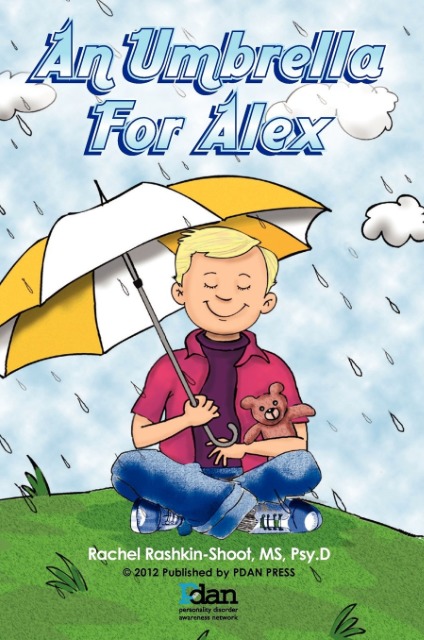
This book narrates a young boy’s journey as he attempts to understand and cope with his mother’s abrupt mood swings. Written to be read with a therapist, parent, or other trusted adult, the story of Alex reassures affected children that they did not cause and are not responsible for the volatile behavior of their parent. Written by Dr. Rachel Rashkin-Shoot, a psychologist educated at the Adler School of Professional Psychology, with an amazing talent for explaining advanced notion in words that children can understand and enjoy. This book was wonderfully illustrated in colors by Danni Diol.
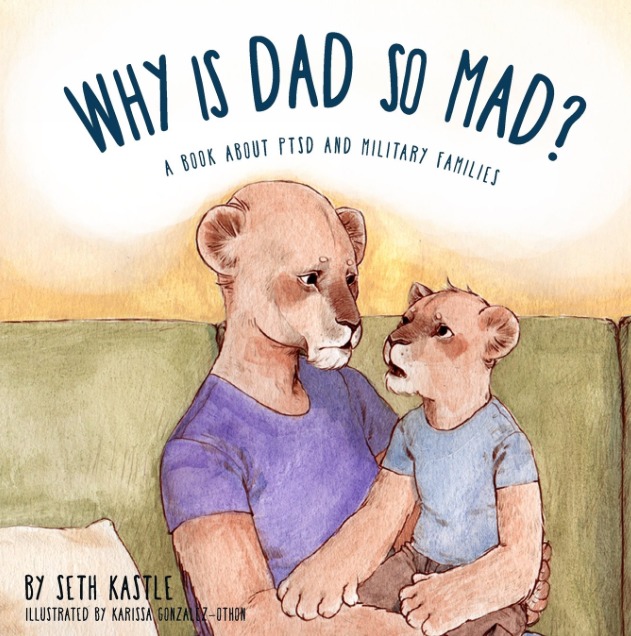
Seth Kastle is a veteran and the author of this children’s book and the upcoming book Why is Mom so mad? Both of these books were written to assist military families who are struggling with PTSD.
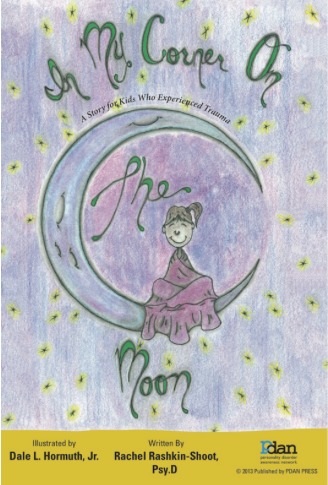
This book is intended for children and adolescents who have experienced some form of trauma (children 11+). Narrated by 12-year-old Abigail, the book is written in a straightforward but gentle style and has a strong psycho-educational component.
The idea is to normalize the response that many children have to overwhelming events in their lives. Through Abigail’s story, trauma is put into simple terms that kids can understand and it’s done without delving into details of her own or any specific trauma, but focusing instead on responses to trauma and the healing process that follows.
Interactive questions at the end of each page encourage discussion among children and the trusted adults in their lives.
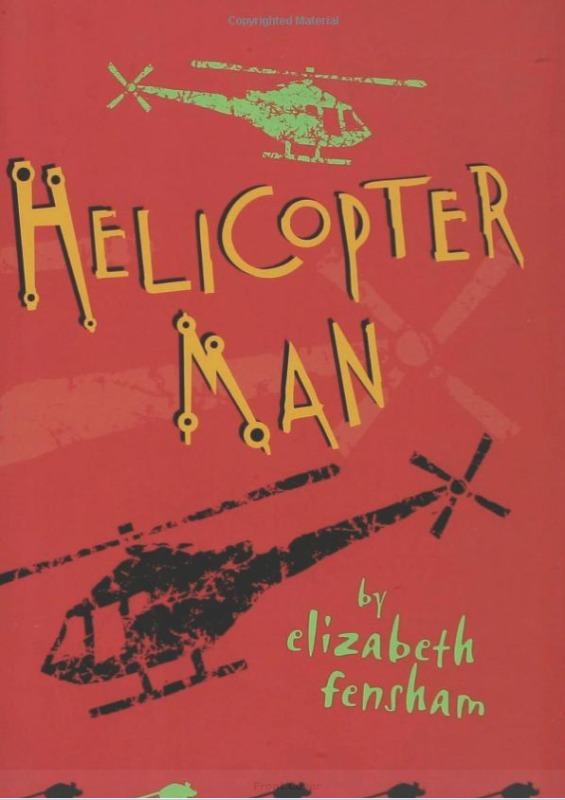
About a boy whose father has schizophrenia, this diary- style book is pitched at children aged 10-13 and up. Very good. Published by Bloomsbury, distributed by Allen and Unwin.
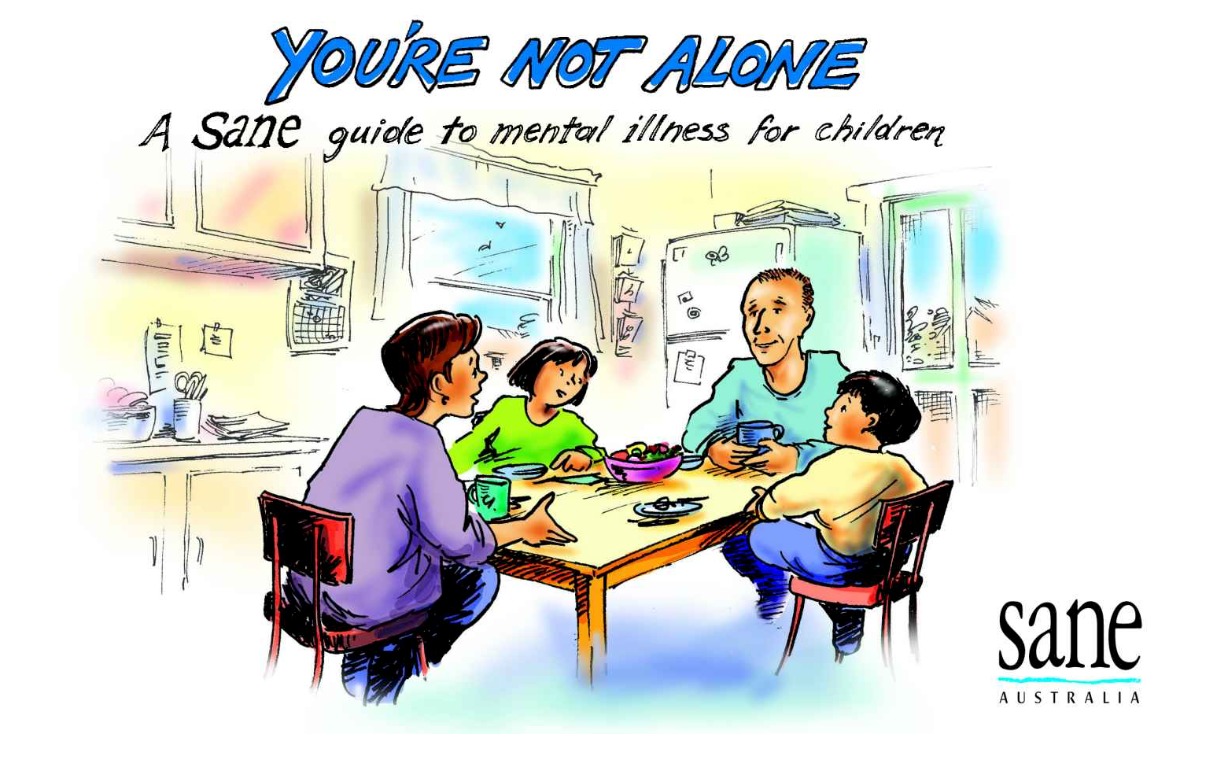
A cartoon- style book inspired by the experiences of Dan Halloran whose mother had schizophrenia. The book is aimed for children aged 8-12 and is very readable. Available through SANE by phone or over their webpage.
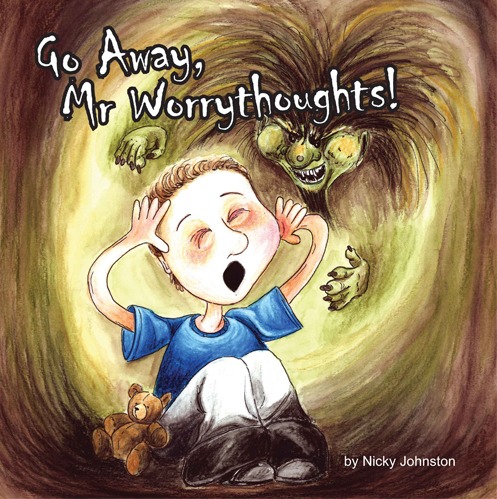
Brayden is an intelligent, confident and courageous boy. Yet, his worry thoughts can be quite unbearable. See how Brayden discovers his superpowers, takes control and is able to live free and happy. Ages 4-10+
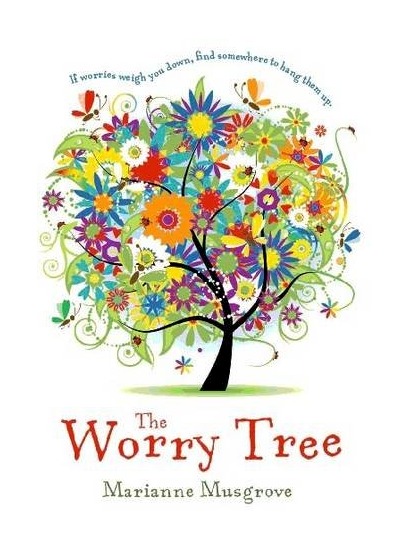
This booklet helps to relieve stress and anxiety in children. It's a novel that's ideal to read to your kids, or give to them to read themselves if they're aged if they're aged 7 to 11 years.
Winner of the Australian Family Therapists Award for Children's Literature 2008 and shortlisted for the Queensland Premier's Literary Award for Best Children's Book, the 2008 Adelaide Festival Award for Children's Literature and the Australian Children's Peace Literature Prize 2007.
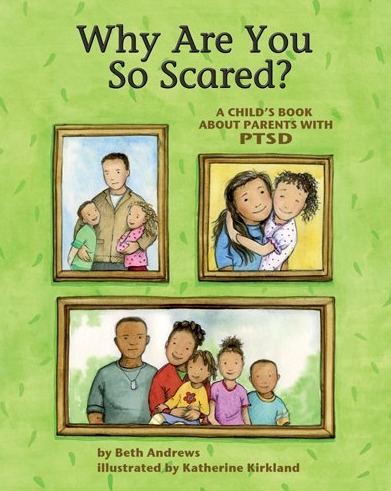
When a parent has post traumatic stress disorder (PTSD), children often feel confused, scared or helpless themselves. This interactive book can help by:
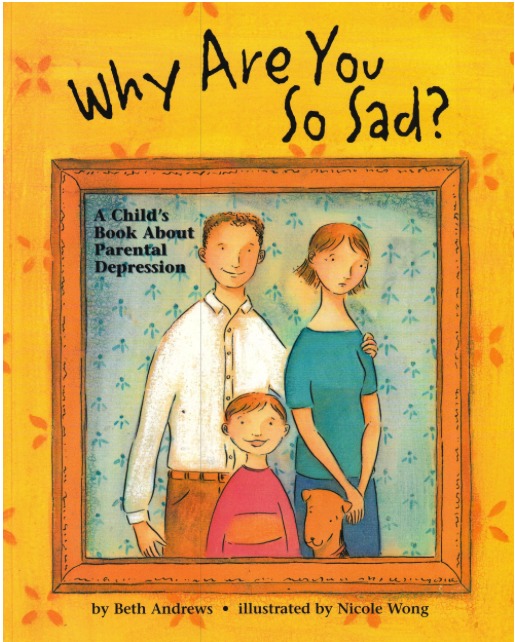
When a parent has depression, children often feel sad and confused themselves. This interactive book can help by:
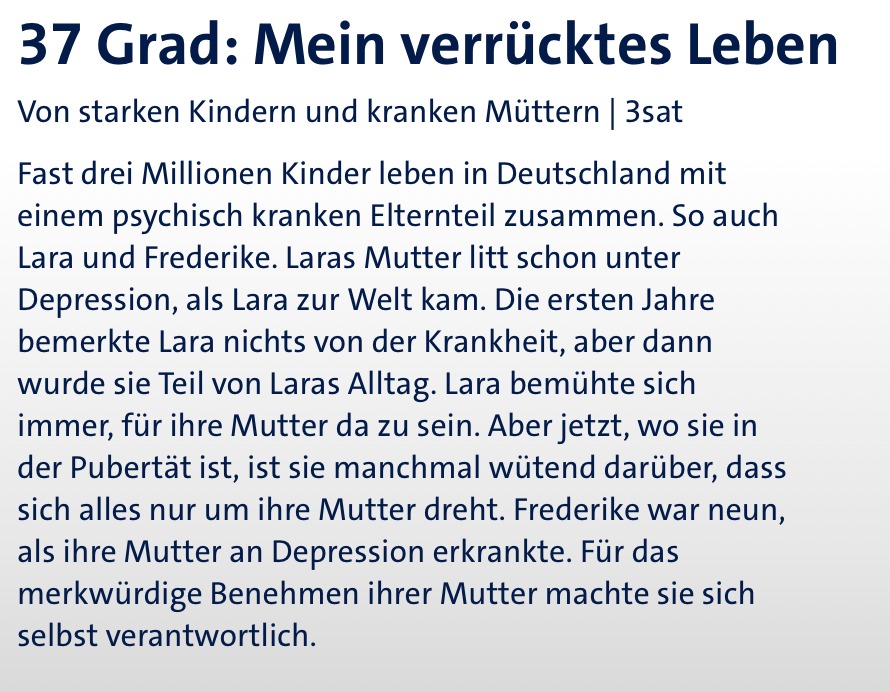
Almost three million children in Germany live with a mentally ill parent. So do Lara and Frederike. Lara's mother was already suffering from depression when Lara was born. For the first few years, Lara didn't notice the illness, but then it became part of Lara's everyday life. Lara always tried to be there for her mother. But now that she is in puberty, she is sometimes angry about the fact that everything revolves around her mother. Frederike was nine when her mother fell ill with depression. She blamed herself for her mother's strange behavior. The feelings of guilt and self-imposed responsibility for her mother and the two brothers depressed her so much that she neglected school and withdrew more and more. Through therapy she learned to deal with the situation better.
Translated with www.DeepL.com/Translator (free version)
Image: https://programm.ard.de/TV/3sat/37-grad--mein-verruecktes-leben/eid_280078912436890
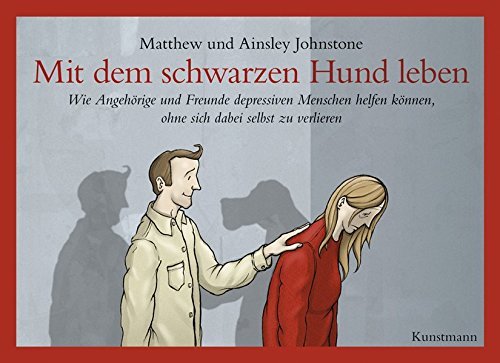
Jeder kennt jemanden, der irgendwann einmal an einer Depression gelitten hat oder noch leidet - am "schwarzen Hund", wie es in diesem Büchlein heißt. Matthew Johnstone war selbst über viele Jahre betroffen, seine Frau Ainsley hat ihn in dieser Zeit begleitet und unterstützt. -Mit dem schwarzen Hund leben" hält eine Fülle praktischer Ratschläge bereit - darüber, wie man eine Depression frühzeitig erkennt, was man dagegen tun kann und was man lieber bleiben lässt, vor allem aber auch darüber, wie Angehörige helfen können, ohne dabei selbst krank zu werden.
Die Johnstones haben eindringliche, berührende und oft humorvolle Bilder für das Leben mit der Depression gefunden und einen Ton, der Betroffene und ihre Angehörigen aus ihrer Isolation und Hilflosigkeit befreit, Trost spendet, Mut macht und Hoffnung verleiht.

Ich bin elf Jahre alt, als mir meine Mutter die Nachricht überbringt: „Der Papa ist tot.“ Er hatte sich vor einen Zug geworfen.
Es beginnen zwanzig Jahre außerordentlicher Belastungen, der Suche nach Liebe und Anerkennung sowie der Stigmatisierung, Tabuisierung und eigenen Verdrängung. Denn wenige Jahre nach dem Tod des Vaters sollte ich auch meine Mutter verlieren. Die paranoide Schizophrenie lässt sie nicht mehr meine Mutter sein. Als ich 31 bin, finden wir sie tot im Wohnzimmer auf der Couch: vermutlich Selbstmord mit Schlaftabletten.
Ich brauche lange, um zu begreifen, dass ich nicht nur meine Eltern, sondern auch das Unbeschwerte meiner Kindheit und Jugend verloren hatte. Erst mit Anfang zwanzig kann ich mich auf den langen Weg machen, erwachsen zu werden in einer Welt, die mir das Gefühl vermittelt, als sei nichts.
Eine Autobiografie.
In schonungslosen Worten und unterfüttert mit Reflexionen, führt Christian Kloß dem Leser das Aufwachsen als Kind von psychisch erkrankten Eltern vor Augen. Mit zwei Suiziden und der von der betroffenen Mutter nicht akzeptierten Psychose, schildert der Autor einen in seiner Härte außergewöhnlichen Fall. Dabei lässt er seine therapeutischen Erfahrungen einfließen, um den betroffenen Lesern – auch im erwachsenen Alter – eine Rückmeldung zu ihrer Situation geben zu können. Scham, Ängste und Trauer werden dabei ebenso behandelt wie auch alltägliche Herausforderungen des aufwachsenden Jugendlichen: soziale Beziehungen, Berufswahl oder Freizeitgestaltung. Mit seinem Buch stößt Christian Kloß in den Kern des problematischen Aufwachsens von Kindern mit psychisch erkrankten Eltern vor: die Suche nach der eigenen Identität und der Frage „Wer bin ich?“.
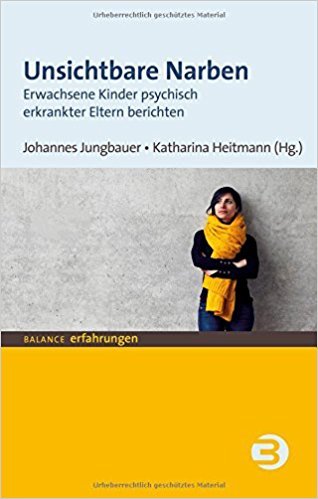
Das Schweigen brechen
Eine psychische Erkrankung in der Familie bringt vielfältige Belastungen und Einschränkungen mit sich. In diesem authentischen und bewegenden Ermutigungsbuch berichten erwachsene Kinder psychisch erkrankter Elternteile ihre Sicht der Dinge.
Die besonderen Erfahrungen, die Kinder und Jugendliche mit einem psychisch erkrankten Elternteil machen, stellen oft ein jahrzehntelang gehütetes Familiengeheimnis dar. In diesem Buch brechen erwachsene Kinder ihr Schweigen, stellen sich ihren Erinnerungen, sprechen über ihre Gefühle und ordnen sie in ihre Biografie ein.
Die zehn Geschichten zeigen ein Spektrum unterschiedlicher Persönlichkeiten und unterschiedlicher Diagnosen der Eltern – von Zwangsstörungen über Borderline, Schizophrenie hin zu Depression und Alkoholabhängigkeit. Manche Themen ziehen sich durch alle Berichte, wie Verantwortungsgefühl, Abgrenzung, Scham und Schuldgefühle, Beziehungsängste, die Suche nach der eigenen Identität sowie Psychotherapie und Selbsthilfe als wichtige Hilfequellen.
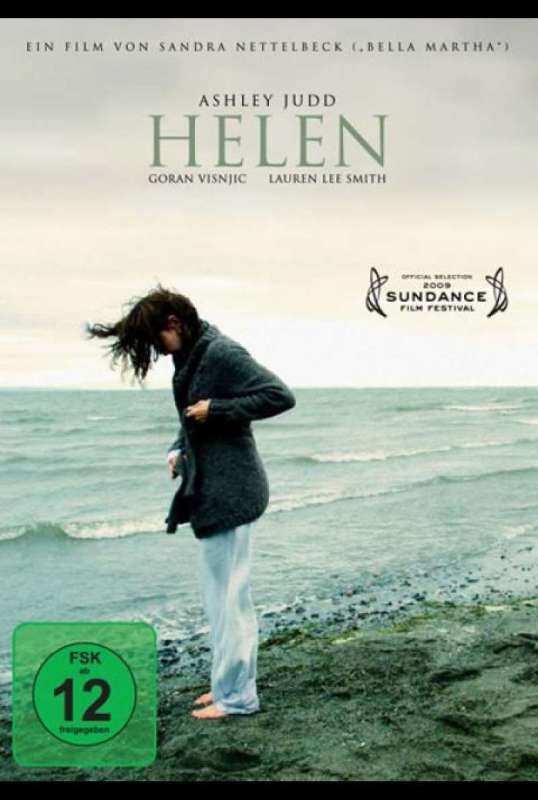
Helen has it all: friends, an attentive second husband, a cheerful teen daughter, musical talent, and a university teaching job. Then, something's amiss: is her husband cheating, does she have a fatal disease, does her past haunt her? There's a quick hospitalization, a disclosure, a bond with one of her students, Mathilde, and a dark chasm that seems to be opening in front of her: can Helen do anything about the problem she won't discuss, or will it swallow her?
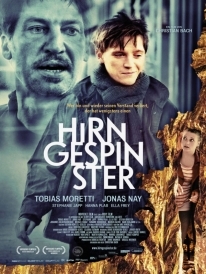
Simon falls head over heels in love with pretty and quick-witted Verena. When his father, who suffers from schizophrenia, has a relapse, Simon devotes himself completely to his mother and little sister and endangers his budding romance. Maneuvering himself into a near-fatal situation, Simon realizes that he cannot change the others' lives, but only his own... 'Flights of Fancy' is an emotionally gripping account of a first love and of a son's loyalty to his father, played with mesmerizing intensity by sensational newcomer Jonas Nay and by internationally acclaimed Tobias Moretti. Both actors were honored with the Best Actors Prizes at Bavarian Film Award 2013 for their outstanding performances.
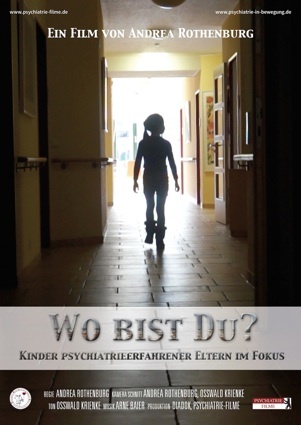

How can we perceive and support "invisible" children?
The video explains the process in adult psychiatry.
An overview about the Village Project - send us a mail if we should send you some for your organisation or to disseminate yourself!
By actively participating in the Village project, you can support children and families in Tyrol. All you have to do is ask your doctor about the Village Project.
You will then be assigned a Village Facilitator who will talk to you about your and your child's everyday life.
The aim of the project is to provide the best possible support to children and their parents who have a mental illness. This involves social, practical and emotional support.
Further information about the project and participation can be found in our flyer, which is attached.
The appendix contains sources and information for families in the time of isolation. In addition, there are some contact points in case of symptoms or other stress.
An overview of recommended resources to support families (and professionals) to talk with children about parental mental illness in an age- and child-appropriate way
An overview about the Village Project - send us a mail if we should send you some for your organisation or to disseminate yourself!
Mit der psychischen Erkrankung eines Elternteils zurechtzukommen, stellt die Kinder vor große Herausforderungen, aber auch die anderen erwachsenen Angehörigen. Immer wieder tauchen Fragen und Unsicherheiten auf. VeRRückte Kindheit bietet Beratung und Information, Online Beratung, Vorträge, und ein Online Forum zum Gedankenaustausch.
Interested parents can be referred to the project either through adult psychiatry or general practice.
The following things have to be done here by the professionals:
Welcome to our community space. Here you are able to contribute to the conversation about children who have a parent with a mental illness. We will set up different topics that can be discussed, and please let us know if you have a suggestion! Please register below if you would like to add a comment. You can use a picture of yourself or create an avatar if you would prefer. This forum has been created so that the public can engage in sharing ideas and opinions about our research project, and the topic. This discussion is closely monitored, so please respect others in your comments. Any offensive, disrespectful, or aggressive comments will be removed and users may be banned from further contributions. We may not be qualified and unable to provide support to any individuals who may become distressed as a result of reading or engaging in our forum. Should the content cause distress, we encourage individuals to seek support through their local mental health support services. If you have specific questions about our research, please get in touch with us through the ‘contact’ page.